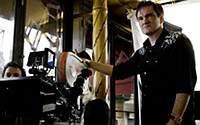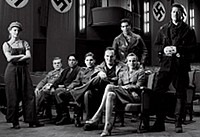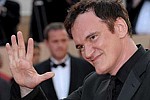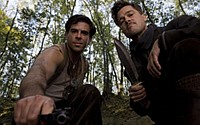 Living or dying by his filmography
Living or dying by his filmographyQuentin Tarantino talks about rewriting history...

Above: directing Inglourious Basterds in Germany; Below: with the cast in a portrait for Vanity Fair

QUENTIN TARANTINO
27.Mar.63, Knoxville, Tennessee
as a director:






 Quentin Tarantino's films aren't everyone's cup of tea; both his fans and his haters are pretty vocal about it. So when he takes on WWII with his latest film, Inglourious Basterds, reactions are predictably polarised. Although no one can deny that Tarantino has made a seriously unusual war movie, which he has been talking about for more than a decade. And in person, he's a force of nature: a bundle of energy tho talks rapidly in a stream-of-consciousness style as he tries to help you understand how he thinks...
Quentin Tarantino's films aren't everyone's cup of tea; both his fans and his haters are pretty vocal about it. So when he takes on WWII with his latest film, Inglourious Basterds, reactions are predictably polarised. Although no one can deny that Tarantino has made a seriously unusual war movie, which he has been talking about for more than a decade. And in person, he's a force of nature: a bundle of energy tho talks rapidly in a stream-of-consciousness style as he tries to help you understand how he thinks...
Were you ever tempted to split this into two films?
I knew I didn't want the movie to be any longer than Pulp Fiction - and it actually isn't. And the only way I could do that was to make sure the script wasn't any longer. That was something I had really got out of the habit of doing - starting from Jackie Brown through Kill Bill, I didn't censor myself at all when it came to writing - "I'm gonna write, I'm a writer, my s**t gets published!" Cut to Kill Bill Volume 1 and 2! So with this, I had the script of Pulp Fiction just always right next to me, and as I was writing my story, I would get maybe 20 pages done and then I would look at the Pulp Fiction script and say, "OK, where was I at page 42 on Pulp Fiction? OK, I was at this place. So where am I now and how much more story do I have to tell?" It's the closest I have come to policing my work, but it was simply in an effort so the thing didn't become elephantine. It wasn't until I got into the third act that I realised that this is going to work. It wasn't like I had another hour in front of me - no, I think I can actually wrap this up in a movie form.

If you muck about too much then you cheapen your entire artistic standing
Whatever turns me on to write the story is what turns me on. I guess you could say if I was too Machiavellian about it I wouldn't have done Grindhouse with Robert Rodriguez. We kind of got derailed as far as our initial idea was concerned, even though I'm a real fan of the movie. So there is that thing - "I'm interested in this story, it excites me and I want to do it" - but I am thinking about my career. Well, f**k the word "career", I am thinking about my filmography. I believe a filmmaker lives or dies by their filmography, and if you muck about too much then you have just cheapened your entire artistic standing. I admire directors that retire at a certain age so they don't just cheapen their filmography with four limp-dick old-man movies at the end of it. I think it is realistic to say your first movie is your first movie, because there's something very special about that, and your second movie is your second movie and so on. I am a student of cinema and I see where directors have gone wrong - at least what I think - or there's not that excitement about their work that happened before. I frankly don't want that to happen to me.
You obviously love old movies. Which ones inspired this film?
There weren't any really specific movies, it was more genres and subgenres or spirits of films that were inspiring to me. When I first sat down to write the film I was thinking of a "bunch of guys on a mission" genre, and so the touchstones - all the films I had talked about before I even wrote the effing thing - were Where Eagles Dare, The Dirty Dozen, Devil's Brigade and Dark of the Sun. And I still love those movies. But having said that, what I found so inspirational when I was doing the movie was watching a lot of the movies made in the '40s that people disparagingly called "American propaganda movies". I don't like that term because I really like those movies and most of them were done by foreign directors who were now living in Hollywood because they couldn't live in their home countries because the Nazis had occupied them.
What are some examples?
You're talking about Jean Renoir with This Land Is Mine, Fritz Lang with Man Hunt and Hangmen Also Die, Jules Dassin with Nazi Agent and A Reunion in France, Douglas Sirk with Hitler's Madman. And one of my favourites is by a Russian director who was working out of France named Leonide Moguy, an action movie called Paris After Dark about the French underground. The thing that was very interesting to me was that these were movies made exactly at the time of World War II, when the Nazis weren't the theoretical evil boogiemen from the past, but were actually a threat. This was actually going on. Not only that, many of these directors had personal experience with the Nazis and, living in exile, obviously had people that they were concerned about back in their home countries. Yet these movies are entertaining, they can be thrilling, they're exciting, many of them have quite an amount of humour in them, in particular something like To Be or Not to Be by Ernst Lubitsch. And they're so literate; the dialogue in these movies is so fantastic.

I’ve never put roadblocks up against my characters
It's not that I did anything stylistically that was like them - I didn't shoot in black and white and I didn't try to recreate them. I might be inspired maybe by their sense of set design, because that was the way I was going to go, to build sets. But there is nothing stylistically that you can use to rank my movie with theirs other than possibly, hopefully, entertainment value.
Why did you decide to change history?
One of the things, when you write - well, the way I write - you're writing your scenario and there are different roads that become available to you that the characters could go down. In particular, screenwriters have a habit of putting roadblocks up against some of those roads because, basically, they can't afford to have their characters go down there because they're writing a movie and trying to sell a script. And I've never put that kind of imposition on my characters: wherever they go I follow. Now when it came to writing this movie, naturally I came across some of those roadblocks, and one of them in particular was history itself. And I was more or less prepared to honour that until I came up actually against it. But my characters don't know they're part of history; they don't know that there are things they can and can't do. Some people have asked me if this is a fairytale, and the first thing I wrote was "Once upon a time in Nazi-occupied France". So if you want to look at it as a fairytale, feel free to look at it that way. And I think the movie works very well in that regard. But I don't personally look at it that way. The way I look at it is this: my characters change the course of history. Now, that didn't happen because my characters didn't exist, but if they had existed everything that happens is actually quite plausible!
CLARIDGES, LONDON • 23.JUL.09
HOME | REVIEWS | AWARDS | NEWS | FESTIVAL | Q&A | ABOUT | TALKBACK

